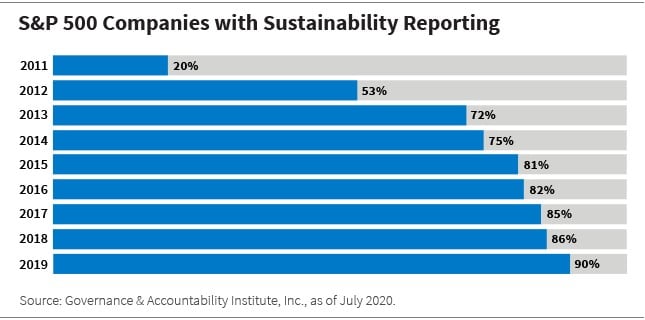Greenhushing: The Silent Barrier to Global Sustainability
Source: Adweek
08 November 2023 – by Eric Koons Comments (0)
As sustainability grows as a critical business practice, greenhushing underpins the discourse. The world has seen a remarkable surge in sustainability initiatives, with companies pushing to align their objectives with environmental, social and governance (ESG) criteria. By 2021, 99% of companies in the S&P 500 and 82% of the top oil and gas companies had published sustainability or corporate responsibility reports, which is good for achieving net zero target and fighting climate change.

Direct financial incentives, stronger regulatory landscapes and a desire for a positive public image fuel this shift. Studies show that consumer demand for sustainable products is steadily rising, sustainability catalyses long-term financial success, and many investors consider ESG in their funding decisions.
However, business sustainability is often an expensive, long-term process that requires ongoing annual sustainability reporting and initiatives that may reduce near-term profits. As a result, some companies have resorted to misrepresenting their sustainability milestones through greenwashing or greenhushing. These practices tarnish the reputational integrity of the organisations involved and undermine the broader sustainability movement.
What Is Greenhushing or Greenhushing – Definition?
Greenhushing is the practice of deliberately understating or concealing sustainability impacts, goals or progress. Contrary to greenwashing, where businesses exaggerate their green initiatives, greenhushing involves playing them down or hiding them altogether. This stems from a desire to appear more sustainable than they are or remove accountability to achieve ESG goals.
For example, a company that knowingly underreports its greenhouse gas emissions or chooses not to report its emissions because they do not like the appearance it gives the company is taking part in greenhushing.
Greenhushing Examples
There are numerous examples of greenhushing in the corporate world. A study revealed that 23% of large private companies that have developed sustainability targets do not plan to publicise or discuss progress towards them.
This selective disclosure obscures the true sustainability the performance of companies and removes accountability for these businesses to achieve their goals. Ultimately, it compromises stakeholder trust and decision-making.
Greenhushing in the Financial Industry
The financial industry has long been a leader in sustainability practices and ESG. However, some financial institutions have reigned back their sustainability-focused messaging in what experts dub a greenhushing effort.
Over the last year, Vanguard and BlackRock, the world’s two largest assessment management companies, have removed references on their website to their internal climate initiatives. Additionally, both companies have removed text regarding their affiliation with several climate-focused organisations. By reducing climate-focused language and content, both companies are reducing public scrutiny on how they meet their internal commitments and reduce external pressure.
Misleading Descriptions for Eco-Friendly Products
The market for eco-friendly products is increasing at a compound annual growth rate of 9.48%. As a result, companies are developing more products that fall into this category. However, these products aren’t always as eco-friendly as they seem.
For example, skincare brand Neutrogena has a “natural” product line marketed as made of 100% natural ingredients. In reality, the products contain small quantities of synthetic compounds and preservatives that can harm the environment. The vague language used by the company makes the products appear good for the environment, and consumers would not know otherwise unless they looked at the product more in-depth.
How Can You Avoid Greenhushing?
Consumers play a vital role in overcoming the challenge of greenhushing by becoming more conscious and knowledgeable about their chosen products. Here’s how consumers can avoid falling victim to greenhushed products:
1. Educate Yourself
Research the company and its environmental claims and look beyond the product labels. Understanding a company’s overall commitment to sustainability will help paint a clear picture of its values.
2. Demand Transparency
Support transparent companies by choosing products that provide detailed information on their packaging, such as the source of ingredients, supply chain practices and third-party certifications. If companies lack transparency, you can use social media or customer service channels to ask companies direct questions about their sustainability efforts and the environmental impact of their products.
3. Support Certified Products
Look for products that have credible third-party certifications, such as USDA Organic, Fair Trade or Energy Star. These certifications often require more transparency and adherence to specific standards. Then, ensure the certifications are valid, current and relevant to the product category.
4. Participate in a Community
Being part of sustainability-focused communities and environmental groups can be very informative. Members often share insights, experiences and recommendations on sustainable products and companies. Participation in educational events can be a way to learn more about sustainable practices and discover brands that are genuinely committed to sustainability actions.
Sustainability Efforts and the Impacts of Greenhushing
Greenhushing casts a shadow on the integrity of sustainable markets and hinders real environmental progress. It perpetuates misinformation, making it challenging for consumers to make informed, ethical choices and for investors to support genuinely sustainable businesses.
This malpractice compromises the credibility of individual companies and weakens the collective effort towards global sustainability. A more transparent, accountable and genuine discourse on sustainability is crucial for fostering economies contributing to global progress and sustainable development goals.
by Eric Koons
Eric is a passionate environmental advocate that believes renewable energy is a key piece in meeting the world’s growing energy demands. He received an environmental science degree from the University of California and has worked to promote environmentally and socially sustainable practices since. Eric’s expertise extends across the environmental field, yet he maintains a strong focus on renewable energy. His work has been featured by leading environmental organizations, such as World Resources Institute and Hitachi ABB Power Grids.
Read more